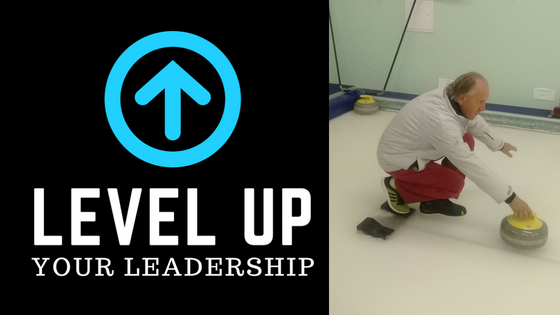Podcast: Play in new window | Download
Rodger Schmidt is the most experienced International Curling Coach and Trainer in the World, serving as an Olympic Curling coach for the last 5 Winter Olympics. In the past two decades he has performed as a National Coaching for six different nations and has been engaged in almost every World and European Championship as a Coach. Rodger has personally competed as an athlete in World, European and Canadian Championships achieving Gold and Silver status in each of these Events during his playing career.
In today’s episode, I spoke with Rodger about how important the “mental” aspect of performance really is for reaching success, no matter if it’s in sports or work or life. Rodger has created his signature mental training coaching program using 5 elements of mental toughness. Rodger uses this program to coach his Olympic athletes to help them develop the mental edge that helps them win medals!
As Rodger says, “all” we have to do is simple: do the right thing at the right time. The basis of the 5 Elements mental program is how do we actually learn how to do the right thing at the right time. The 5 elements of Mental Strength include:
- Believe: you need believe in yourself and your abilities. Belief is built using a process over time — you have to start with some belief, then do the diligence to build even more capabilities, and that will add to your ability to believe. Believing is the process of having trust and faith in your teammates, yourself, and your ability.
- Diligence: Diligence is the continuous hard work that feeds your belief. Practicing diligence will bring you more success and give you more confidence.
- M100:1: Put your mind 100% focused on only 1 thing (hence the name M100:1). The idea is similar to mindfulness where you stop thinking about 14 things and just do the 1 thing you need to do now.
- Focus and Concentration: Pretty self-explanatory. Concentrate on what you’re doing and don’t get distracted by what’s going on around you OR what’s going on inside your mind.
- Insight: Insight is like a 6th sense where you have the ability to know what’s going to happen before it happens. It’s the differentiator of highly successful performers because they’re in the right place at the right time to do the right thing at the right time – the ultimate goal!

I’m also really excited to share that, after this podcast, Rodger and I have decided to partner together to create a High-Performing Teams leadership development training program for leadership and executive teams. It’s a unique concept where participants actually get out on the ice and try out curling with Rodger as their coach. And, of course, beyond the physical of playing is the learning that combines the mental strength exercises Rodger uses with his Olympic athletes AND team cohesion and development best practices in corporate types of working environments led by myself. The program would be customized to meet your team’s individual needs, whether you need to leverage conflict, learn more effective communication styles or create psychological safety to foster innovation. If you’re interested in learning more about the program, reach out to me at lisa@lisachristen.com and I’m happy to be in touch.
In this episode, we also discussed:
- How Rodger changed my life
- How growing up in a very small town (population: 100) positively impacted and changed the trajectory of his life
- How the sport of curling has grown so immensely popular and why it’s the most popular / most watched Winter Olympics sport.
- Why it’s almost impossible not to fall down and embarrass yourself the first time anyone tries curling (I find that such a poetic metaphor for trying something new in life in general).
- How you can learn how to do the right thing at the right time, regardless of the pressure of the situation and the uncertainty surrounding the outcomes.
- Why there was resistance to sports coaches allowing psychologists on the team in the past – and why modern teams have learned psychologists are absolutely necessary for success.
- Why it’s better to start a worthwhile project that’s important to you even if you know it’s not going to be perfect or the best one out there.
- How structure supports us in the process of making progress towards the goals that are most important to us
- Why everyone, whether an athlete or an executive or anyone in between, needs to follow a mental program
- How too much ego gets in the way of reaching your fullest potential – but how the right amount of ego brings you great achievements and success.
- How stealing an idea that already exists but applying it in a new way and to a new field brings new levels of enlightenment
- How an Olympic team who never came back to win after a crushing first half pulled off a victory they never should have won (and why they continued to win when the situation seemed dire).
- The difference between what good performers do vs. great performers do.
- How changing your belief in yourself is different in theory vs. in practice.
- Why we put more mental attention, energy, and intention into preparing for their sports as opposed to preparing themselves for life (and why life is more important).
- How a program brings consistency to your efforts and leads to results.
- How habits run our lives and we can take advantage of our habits (and how our pesky over-thinking side tends to come in when the stress piles on).
- Why you need to appreciate yourself.
- How to replace bad habits with good habits (hint: use a structure).
- Why people too often focus on actions that bring immediate rewards vs. working on the tough mental strength topics (that don’t show an immediate reward)
- Why under stress and pressure we go back to doing what we always did.
- Why self-belief is the absolute key to your success and how it’s likely the number one thing stopping you from big-time success
- How emotions can be managed more than we often believe (ask yourself in the morning: how do you want to feel today? Setting an emotional attention and awareness can change your behavior)
- How to catch an emotion before it escalates.
- How to channel your emotions to keep what you need and get rid of the emotions you don’t need.
- How a nuanced vocabulary around emotions would help to break escalation.
- How to connect with yourself and your emotions by checking in with your body.
- Why no new ideas exist but an old idea packaged in a new way can still be interesting, insightful, and impactful.
- Why your messages to your employees need to be tailored to meet their individual needs.
- Why you shouldn’t be running away from pressure – pressure isn’t your enemy! You need to care enough And tips for how to make pressure your friend.
- Why it has to be okay to have an ego and how to cultivate all the individual egos into the team “wego” (the “we” has to be bigger than the “me” on the team).
- The power of breath and how it help you reduce impulses and habits.
Links:
- Saskatchewan, Canada
- Curling
- Curling spoof video with vacuum robot and broom
- Rodger Schmidt’s Mental Training program
- Dr. Saul Miller and his YouTube channel Sport Psychology School
- Five Elements of Curling Technique (book by Rodger Schmidt and Team USA)
- Thích Nhất Hạnh, Zen Master
- Russian National Women’s Curling Team, skipped by Anna Sidorova
- Mindfulness
- Wayne Gretzky
- Winter Universiade (International multi-sport competition event for University students)
- Emotional Agility by Susan David
- Lisa Feldman Barrett, Distinguished psychology professor and expert on emotions
- Vince Lombardi
- Improvisational Theater
If you enjoyed the podcast, please rate and review it on iTunes or Google Play – your ratings make a big difference in helping others discover Level Up Your Leadership. Want future episodes automatically delivered to your device? Be sure to subscribe. Thanks for listening!
